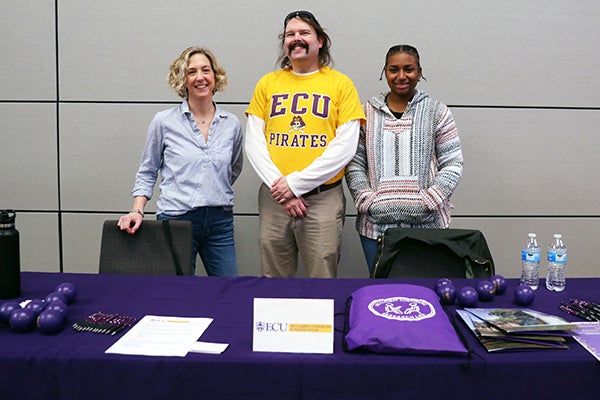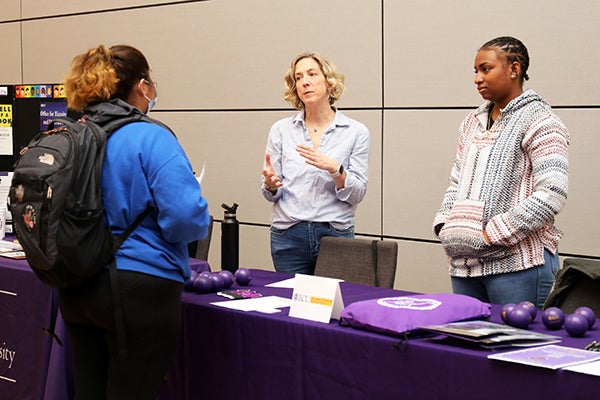ECU’s McClammy Lab celebrates 10 years of counseling success, history
During the last few years, the importance of mental health has become a prevalent topic. This increased focus showcases the importance of spaces like East Carolina University’s McClammy Counseling and Research Lab.
Celebrating its 10-year anniversary this academic year, McClammy has served the ECU community through counseling and outreach with a focus on connecting students to resources.
“The purpose of the lab is to be able to run a very high-quality level of counseling while at the same time being able to conduct counseling education research and be a modern, state-of-the-art facility to train our counselor education students,” said Jason Perry, McClammy’s director and a teaching assistant professor in the College of Education’s counselor education program.

Jason Perry, center, and graduate assistants Emily Sutherland, left, and Kyree Hall attended East Carolina University’s National Day of Racial Healing as representatives for the McClammy Counseling and Research Lab. (Photos by Kristen Martin)
As part of their coursework, counselor education students must complete an internship. McClammy offers students the chance to complete that internship with a doctorate level, licensed supervisor.
“I am excited to work with the lab for several reasons,” said Emily Sutherland, a graduate student pursuing her master’s in clinical mental health counseling. “I’m eager to directly help people who are struggling. I’m also excited to learn how to modify my techniques to best serve each individual client. I’m also looking forward to working and learning more with Dr. Perry and the other people involved with the lab. Lastly, I feel that working with the lab will offer me valuable experiences in real time, while being supported by my professors and co-workers.”
Students can take the information they’re learning in the classroom and their experiences during their internship working with the McClammy Lab and share it with others in the field through scholarly journals and conferences, including the Conference of North Carolina Counseling Association and the American Counseling Association.
“That’s an important component — to be able to take what we learn by having these experiences and share that with others in the science,” Perry said.
Students outside of the College of Education are also able to complete internships at the lab. Becca Norman, a graduate student in rehabilitation counseling, started working at the lab this spring.
“I am really excited to be able to feel empowered enough to test what I have learned in my classes in a real-world setting where my contribution to sessions can make a difference in someone’s life with the added reassurance of safety and room for learning, exploration and guidance of the laboratory setting,” she said. “Not all interns can say that they are getting this specific experience and I count myself lucky to be able to do so.”
Growing services
Perry recently became the director of McClammy and looks to grow the services the lab offers without sacrificing any of the quality. He has started by adding more group counseling programs to the lab’s existing individual counseling services. During the fall semester, the lab offered a program for students experiencing homesickness after moving to ECU and Greenville.
“There is a lot of value in group. Our students in the counselor education program complete coursework in group counseling techniques, but we don’t really practice that skill quite as much,” Perry said.
Another option available to the lab is teletherapy, a service that became more common during the COVID-19 pandemic.
“Teletherapy is here to stay, but the textbooks haven’t caught up with that yet,” Perry said. “I think that puts us in a really unique position.”
Perry is also interested in potentially growing in-person services outside of the walls of the lab and even ECU’s main campus. He stressed the importance of meeting people where they are, whether it’s another campus location, local schools or any community space in eastern North Carolina.

Sutherland and Hall talk to a student about the McClammy Counseling and Research Lab.
“We’re very fortunate to have this space and have this building but we’re not bound by these walls,” he said. “We’re talking about meeting people where they are and when you think about that from a counseling perspective, that’s very humanist.”
While it is important to think about the future, Perry wants to ensure the roots of the program and the lab aren’t forgotten. When it was founded 10 years ago, the original purpose of the endowment given by William Charles McClammy was to support the education of students pursuing a career in school counseling.
“It’s important to build this person’s story because this is somebody who cared about ECU and cared about this program enough to leave a very generous sum of money behind for the purpose of making this program a reality,” Perry said.
Since its inception, the lab has been located in the Ragsdale building, adding to the rich history of the building. Built in 1923, Ragsdale originally housed faculty members, was the first home for the School of Medicine, and was the residence hall for ECU’s first full-time Black student, Laura Marie Leary.
The faculty involved in the lab’s creation have their own impressive credentials, including Kylie Dotson-Blake, who served as the clinical experiences coordinator at the time. She is now the president and CEO of the National Board for Certified Counselors.
Before becoming director of the lab, Perry was involved during his graduate studies. North Carolina State University’s Beth Vincent is another alumna of the lab. She was the first student co-director along with Alison Sappie, a licensed mental health counselor associate in Raleigh. Vincent is now an assistant teaching professor and clinical coordinator for on-campus programs at NCSU.
“I think that’s important for us to emphasize,” Perry said. “There’s been a history of success and I think there’s this history of excellence with the faculty but also with the students.”